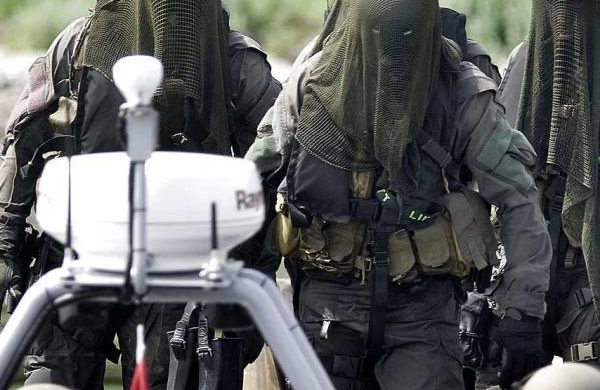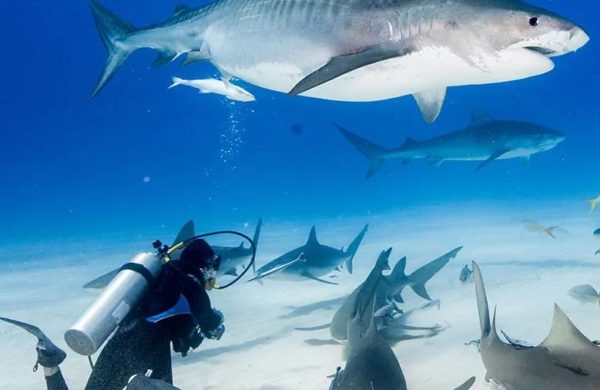
Steve Goodley, a standout amateur golfer, now makes a living diving for lost balls. He’ll try any golf course that’s a day’s drive from York and Dauphin counties. And he finds a lot more than balls in those murky ponds. Jason Plotkin, York Daily Record
There are good days doing the dirty, dangerous, most unexpected job around.
Like when the sun shines and a winter day warms through the 50s.
There was no glass or jagged metal on the bottom of the pond to cut hands. No snapping turtles to latch onto fingers. No ice to close off escape routes on that February morning.
And, best of all, no tangled lines to suffocate.
Steve Goodley dives murky, mysterious water for a living — in all weather, all seasons — in the pursuit of lost golf balls. He scours every course possible within a day’s drive from York and Dauphin counties and is even planning a mission to the Midwest.
He’s dived into some ponds enough to feel at home, like the one next to the 18th green of the Heritage Hills Golf Resort in Springettsbury Township. On that brilliant winter morning, Goodley disappeared beneath the water for 20 minutes at a time, finally dragging a 100-pound laundry bag full of cheery-colored balls from the muck.
Each one represented a few cents of a potential six-figure income — one requiring intense preparation, endurance and significant hazards.
Diving for golf balls is a pretty good living, if you can handle the hell of it.
• • •
There are the bad days in the most unexpected job around.
Start with the water. It’s often a foul-smelling soup of chemical run-off, geese droppings and who-knows-what-else.
“A cut can go septic pretty quickly,” Goodley said.
Plus, the bottom of even a shallow pond can be disorienting. Any movement unleashes a fury of sediment that renders visibility non-existent, all the easier to snag your airline on anything from the tentacles of a sprinkler to fishing tackle tangled in low-hanging trees.
“It’s very easy to drown doing this,” Goodley said without hesitating. “There’s all kind of things you can get hung up on.
“And if you panic … that’s the worst thing you can do.”
He knows that well. Take the time he accidentally rammed into an underwater pole while diving a frozen pond. His mask flipped sideways. His regulator popped out of his mouth.
He immediately bolted to the surface and slammed into six inches of ice, which felt like concrete.
Fortunately, he calmed and gathered his thoughts. He grabbed onto his air line, using it as a guide, and gradually pulled himself to the opening in the ice.
On another dive, the engine that pumps his air flipped off its floating inner-tube and cracked him in the face. He lost his mask and wasn’t able to breathe.
Even worse, he plummeted to the bottom, anchored to a thousand golf balls.
He agonizingly worked the knot free on the bag of balls and shot to the surface — just as he started to pass out.
He spit out “a ton of water,” swam to the bank and lay there for what seemed like forever.
“And I thought, ‘Is this really what I should be doing with my life?'”
• • •
Goodley keeps diving for golf balls for the independence of running his own business, and to stay close to the game.
He also believes he can do it better than most.
He’s always been supremely confident. He had to be in order to master the most unforgiving of sports, first at Dallastown Area High School in the early 1990s and then on scholarship at the College of Charleston. He even toured as a pro for a few years.
When that dried up, he turned to sales. But he missed golf. The idea for his latest venture came from his father, Tony, who dove for balls in the warm months to earn vacation money.
Steve Goodley decided to try it full-time a couple of years ago. The challenge of making it work through the fall, winter and spring drove him even harder.
And when he began finding enough golf balls — and reliable buyers to take them — he realized he was conquering an under-worked market made possible by errant swings, unfortunate rolls and lost tempers.
An estimated 200 million golf balls are lost in the U.S. each year, said Jeff Wall, vice president of procurement with PG Professional Golf, which bills itself as the world’s largest recycled golf ball company. Reed said PG buys from only about 30 operations as small as Goodley’s and said he is impressed by his tenacity and perseverance.
Goodley is one of the few in the state, if not beyond, who dives full-time and year-round. Bigger companies use “rollers” that pick balls off the bottom of ponds. While the machines miss potential pockets of balls — hiding places where only hands can reach — they alleviate the need for prolonged time in the water.
And there’s good reason for that.
“It’s always chilly, murky. It’s not like diving in the Caribbean,” said Don Beardsley, the vice president of golf operations at Heritage Hills. “I’ve done some scuba diving in my time, but I’m not going in there.”
Goodley said he once accidentally grabbed a snapping turtle so large it took him for a short ride along the bottom. He’s grabbed onto everything from car keys to bags full of clubs — to a car.
He’s come face-to-face with snakes. In the Deep South, divers must navigate poisonous water moccasins and alligators.
The risks don’t seem to faze those who buy in, like Roy Rossbauer, 45, a Bensalem, Pennsylvania, native who now dives out of Hilton Head, South Carolina.
Unlike Goodley, he uses scuba tanks and calms himself by singing through his regulator for hours at a time. He claims to earn between $250 and $1,000 a day diving in one of the top golf destinations in the world.
Rossbauer describes gators as more of a nuisance than a danger. He isn’t above ramming the aggressive ones in the snout or cracking them in the eyes with a fist full of sand. “You have to let them know who’s boss.”
Really, it’s all about what stands in the way of making a living.
Though Goodley earns only cents on each ball — and splits that with the course — it still adds up when he often finds a few thousand balls a day. A recent outing in Lancaster County netted him more than 100,000 balls over a dozen dives.
In turn, companies like PG Professional Golf, based in Texas, clean and re-package these recycled balls and sell them for less than half the price of new ones online, in golf course shops and through retailers.
“Working for yourself is priceless,” Goodley said. “I can support my family doing it, and I can be out of the water and home by the middle of the afternoon.”
Which means the rest of the day is for his young daughter or hunting or playing another round.
And for thinking about the next day. Not knowing what you may find each time you get in the water has a way of motivating, too.
Which leads to one more golf ball story.
It started with Goodley dropping to the bottom of a Maryland pond to clean off an intake pipe, a typical service he provides for the course.
That’s when things got weird. This pond was the deepest he was ever in, maybe 40 feet.
“I just kept falling and falling and falling, and I can feel the pressure of my face mask pushing in, and I’m like, ‘Oh, my God.’
“I kept going and suddenly I glanced off something big, which scared the hell out of me.”
He crawled around the massive object for 10 minutes before finally grabbing onto something familiar: a windshield wiper.
He found a car at the bottom of the pond.
And he never did get straight answers as to why it was there.
Then again, why did he once find nine Odyssey putters scattered in the mud?
He doesn’t think much about those things. He focuses on his preparation and safety, which allows him to actually enjoy working in such dark, claustrophobic places.
“You’re in your own world. You just hear the gentle hum of the engine and your breathing in and out. It’s kind of like your own peaceful little world.”



